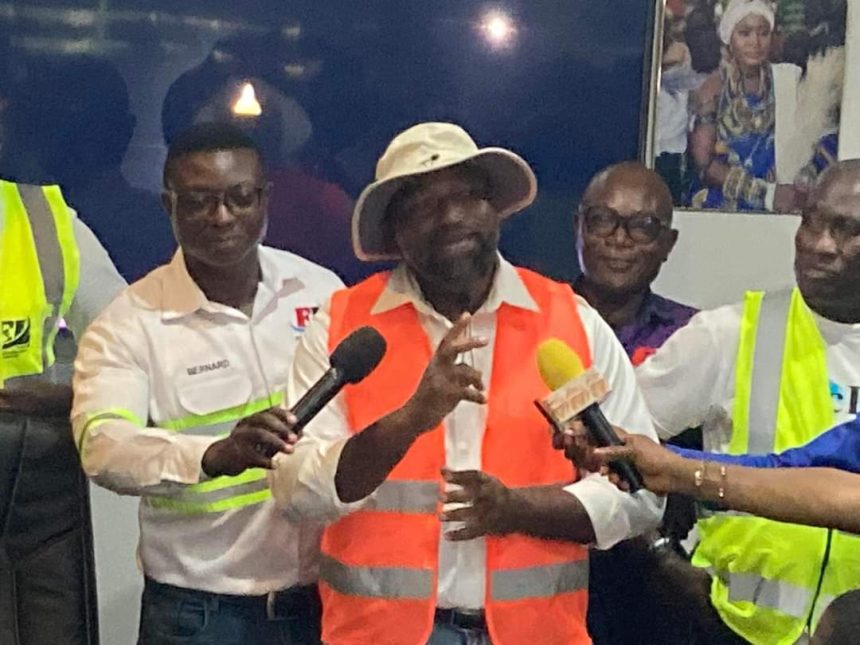In an effort to enhance their knowledge and shed light on the significant operations of the Electrochem Salt Washing Plant, the GaDangme journalists group has embarked on an insightful tour of the facility in Ada to give them a fair idea of how it operates.
The group, comprising newspaper reporters, television broadcast personnel, radio hosts, and prominent online publishers, aimed to gain a deeper understanding of the plant’s functions and its impact on the local community.
The tour was aimed at solidifying an existing relationship with the media, especially the GaDangme journalists, and further deepening stakeholder confidence in the company’s operations.
It also sought to afford the management of the company the opportunity to fraternize with media practitioners and recognize them for their enormous support of the Electrochem Salt Washing Plant.
Located in the scenic town of Ada, the Electrochem Salt Washing Plant holds a key position in the region’s salt production industry. With a commitment to quality and sustainability, the facility carries out a meticulous salt production process, adhering to stringent standards of purity and environmental responsibility.
During their visit, the GaDangme journalists were given an exclusive opportunity to explore the plant’s various units and witness firsthand the complex procedures involved in salt processing. Guided by the plant’s knowledgeable staff, the journalists were provided with detailed insights into the entire production cycle, from the initial extraction of raw salt to the final packaging and distribution stages.
As the journalists walked through the facility, they observed cutting-edge machinery and advanced technology that showcased the plant’s efficiency and dedication to modern salt processing techniques. The group learned about the plant’s utilization of renewable energy sources and innovative waste management systems, reflecting the company’s commitment to minimizing its environmental footprint.
Briefing the journalists, Nana Ama Yirrah, the lead member of the Electrochem Ghana Sustainability Programme Department, revealed that ownership of the Songor lagoon and surrounding lands belongs to four clans in the Ada Traditional area. These clans, namely Adibiawe, Lomobiawe, Tekperbiawe, and Dangmebiawe, have allodial interests in the area. Furthermore, the Songor lagoon has been identified as having significant salt deposits, which were considered a communal resource accessible to all inhabitants of the Ada Traditional area.
She added that Electrochem Ghana Limited, the company behind the plant, operates based on four main focus areas: Strategic Business Standards and Practices, Sustainability, Community Development, and Global Partnership and Growth.
Nana Ama Yirrah emphasized that the company has formed strategic partnerships with local and international organizations that possess the necessary technical expertise in the industry.
Additionally, she highlighted Electrochem Ghana Limited’s commitment to supporting environmental sustainability, safe water access, sanitation and hygiene, local economic development, community health and safety, and education in the Ada Traditional area.
On his part, the Public Relations Officer for Electrochem Ghana Limited, Bernard Klortey, noted that their operations are centred on producing salt in large commercial volumes, and the core mandate is the need to mechanize a significant part of the concession to increase productivity.
According to him, Electrochem Ghana Limited has taken significant steps towards mechanizing its operations, including the salt washing plants. He added that the Electrochem industrial area covers an area of about 30 acres on a 41,000-acre concession that spans the Ada West and Ada East Districts.
Commenting on the pump stations where the sea water is pumped to the Songor lagoon, Mr Klortey stated that the pump station is located at the intake point of the salt process, which increases the pumping of brine (salt water) from an initial volume of 100 litres per second to 5,250 litres per second into the evaporators (the Songor lagoon) and salt crystallises.
The Chairman of McDan Group, Dr Daniel McKorley, revealed that Electrochem Ghana Limited, a subsidiary of the group, has made a substantial investment of 88 million dollars into the Songor Salt Project, aimed at tapping into the rich salt deposits found in the enclave of the Songor lagoon.
He further stated that an additional 167 million dollars is required to fully cover the 41,000-acre concession of the project, saying that the investment is crucial for the company to effectively extract and exploit the salt deposits in the area.
Dr Daniel McKorley added that the investment made by Electrochem Ghana Limited signifies their commitment to the Songor Salt Project and their dedication to sustainable development and partnerships, stating that with continued support and funding, the project has the potential to greatly benefit the local communities and contribute to economic growth in the region.
The GaDangme journalist group had the chance to engage in discussions with the managers and other key personnel, enabling them to pose pertinent questions regarding the facility’s operations and its integration within the local community.
They discovered that the Electrochem Salt Washing Plant actively strives to create employment opportunities for the surrounding communities, contributing to the region’s socio-economic development.
By visiting the Electrochem Salt Washing Plant, the GaDangme journalist group aimed to bridge the gap between the plant’s activities and public knowledge.
It is their mission to uncover the hidden stories and shed light on the significance and impact of various industries on local communities.
With their visit, they hope to promote awareness and understanding among the general public about the critical role played by the Electrochem Salt Processing Plant in producing high-quality salt while prioritizing environmental sustainability.
The GaDangme journalist group left the Electrochem Salt
Processing Pant with a newfound appreciation for the intricate processes involved in the salt production industry.
Equipped with a wealth of knowledge gathered during their visit, the journalists are now eager to share their insights with their readers, viewers, and listeners, thereby fostering a deeper connection between the public and this vital sector.







